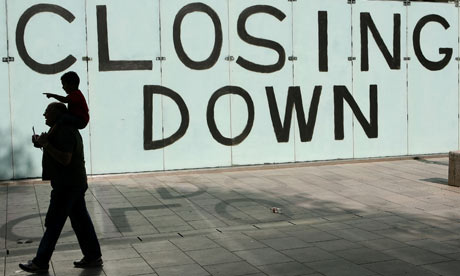More British businesses in critical state, report warns
Insolvency specialist says 140,000 firms are in financial difficulties and warns that those in trouble are collapsing faster than in previous recessions
More than 140,000 UK companies were dragged into financial difficulties in the last quarter, according to research that also warned firms are collapsing faster than in previous recessions.
Insolvency specialist Begbies Traynor reported that the number of companies experiencing significant or critical financial problems rose 6% in the last three months of 2009, compared with the previous quarter.
It also said that firms are finding it harder to struggle along once they hit problems.
"A new trend is emerging, which indicates that a higher number of business failures are occurring at an earlier stage of deterioration than in previous recessions," it said.

'There is every reason to suggest that the insolvency peaks of this recession remain some way off,' Begbies Traynor warned. Photograph: Phil Noble/Reuters
Begbies Traynor believes the government's attempts to support British business were having some effect, but predicted a spike in failures later this year when this help is terminated.
"Experience of the last four recessions tells us that unemployment levels and corporate and personal insolvencies have lagged behind technical recession by one to two years. With tax and interest rates certain to rise, as well as increasing pressure on consumer spending, there is every reason to suggest that the insolvency peaks of this recession remain some way off," warned Ric Traynor, executive chairman.
"While business finance is expected to become more readily available during the first half of 2010, we anticipate a rise in the levels of financial distress during the second half of 2010, as temporary financial support measures are unwound."
On an optimistic note, the number of companies facing serious or critical problems was 14% lower than a year ago. Begbies Traynor said this was partly because creditors are now taking a more lenient approach than they did in the immediate aftermath of the collapse of Lehman Brothers, when there was a "near panic" dash to call in debts.
Another factor helping the sector is the time-to-pay scheme offered by HM Revenue & Customs, which lets cash-strapped firms defer tax payments. Almost 250,000 companies have taken up this offer, deferring over £4.3bn of tax payments, according to the latest official data.
Begbies Traynor fears some businesses are storing up problems, and will collapse when the need to repay debt catches up with them later in the year.
"HMRC remains one of the principal creditors in many insolvencies and we fear that when the current time-to-pay scheme, which provided a lifeline to many businesses, is finished there will be a significant rise in company failures – most probably from the third quarter of 2010 onwards," it predicted.
Scottish businesses are suffering particularly badly from the downturn, with 41% more companies facing critical problems than a year ago. To be classed as a company with critical problems, a firm would need to be facing county court judgments of at least £5,000, or a petition to wind the company up. Significant problems would include either a court action, or a set of accounts classed as 'average', 'poor', 'very poor', 'insolvent' or 'out of date'. Begbies Traynor classed 4,040 companies in the critical camp, and 137,487 facing significant problems.
The services sector saw a 22% rise in companies facing significant problems, compared with the previous quarter. Construction firms performed better, with a 2% decline.

No comments:
Post a Comment